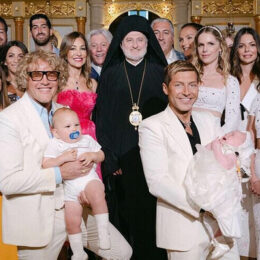Daily Mail | Peter Hitchens | June 2, 2007 |
Am I my brother’s reviewer? A word of explanation is needed here. Some of you may know that I have a brother, Christopher, who disagrees with me about almost everything.
Some of those who read his books and articles also know that I exist, though they often dislike me if so. But in general we inhabit separate worlds – in more ways than one.
He is of the Left, lives in the United States and recently became an American citizen. I am of the Right and, after some years in Russia and America, live in the heart of England. Occasionally we clash in public.
We disagreed about the Iraq War – he was for it, I was against it. Despite the occasional temptation, I have never reviewed any of his books until today.
But now, in God Is Not Great, he has written about religion itself, attacking it as a stupid delusion.
This case, I feel, needs an answer. Most of the British elite will applaud, since they see religion as an embarrassing and (worse) unfashionable form of mania.
And I am no less qualified to defend God than Christopher is to attack him, neither of us being experts on the subject.
People sometimes ask how two brothers, born less than three years apart, should have come to such different conclusions.
To which I’d answer that I’m not sure they’re as different as they look, and that it’s not over yet.
Christopher has quite often written and spoken about our upbringing and background, whereas I haven’t, but I think I’m now entitled to give a small account of what we have in common.
Because my father was in the Navy, we were brought up in a very old-fashioned Britain. Looking back, it often seems to have been a sombre landscape of grey warships and the stench of fuel-oil – but also of cathedral towers, bells and choral evensong.
. . . more




I admire Hitchens a great deal for his courage. Although I don’t share his atheism, as his brother points out, “… it’s not over yet.”
FrontpageMagazine.com currently has the transcript of “An evenining with Christopher Hitchens.” Here’s one quote:
“The feminist movement didn’t care there was a rapist in the Oval Office? The women’s movement didn’t mind there was a serial abuser, someone who was always hitting on the help, in the Oval Office? They didn’t mind this?
“Well, I don’t think I’m being too judgmental in saying, well, I do. I’m not going to have a rapist as President. It’s not brave at all to come out and say that. It would just be cowardly not to do it; let’s be clear. It was sickening to find that friends of mine were involved in covering up for this psychopath.”
And another:
“Hannah Arendt, actually, defined totalitarianism in the Stalin period as that. Said the great genius of Stalin was to have replaced all discussions of policy and all arguments about policy with discussions about motive. So whatever anyone might say about the fairly public shortcomings of, for example, Soviet agricultural policy, the question would not be, Is this comrade right in his criticism? It would be, Why has he said that? And why now? And who’s put him up to it? Who’s paying him? It’s one of the origins of totalitarianism is that replacement of an analysis with motive.
That’s so amusing. Like when right-wing critics of the Bush Administration were labeled ‘Bush Haters’ and accused of having ‘Bush Derangement Syndrome,’ even though many of us had voted for him in 2000.
Come to think of it, Hitchens did quite a bit of this same bashing.
Did he finally wake up?
What’s amusing, that totalitarians attack motive rather than offer analysis, or that Hitchen’s made the point?
Hitchens is interviewed on Frontpagemag.com today.
Interesting.
Fr. Hans writes: “Hitchens is interviewed on Frontpagemag.com today.”
So what’s your take on the interview content? I thought the interview was very good, as far as allowing Hitchens an opportunity to express his views.
Hitchens makes a number of good points, but I did have a problem with his blanket condemnation of religion. In Western culture and society Christianity infuses everything, and everyone — whether or not they want to be — has been influenced by Christianity. When Hitchens “rejects” Christianity it reminds me of a fellow on a boat in the middle of the ocean who “rejects” water.
Note to Fr. Hans. For future reference, I think it’s great idea from time to time to post articles that are not necessarily consistent with a conservative or religious perspective. It helps to “level the playing field,” and adds some interesting and provocative content.
Jim, I don’t mind the idea at all, but frankly it is hard to find material that rises above empty headed moralizing. Look at Dean’s response to Tom C. for example. It’s basically a screed, a lot of disapprobatory wind, like the stuff you find in “The Nation” — elegantly expressed perhaps but hollow at its core.
Hitchens is worthwhile because at least he has some moral courage. Nat Henthoff, although I disagree with him on many things, shows the same quality.
But the cultural left (broadly speaking), because it doesn’t really believe that morals have a transcendent reference, tends to view all things moral in terms of politics with little regard about the ramifications of their ideas down the line.
I agree with Thomas Sowell in this regard: cultural liberals see themselves as the anointed, the saviors of society. This explains their disproportionate reactions, perhaps even hatred (not too strong a term I think) towards the religious right. The religious right does does not recognize the liberal claim of moral stewardship over the culture as legitimate. I don’t either although I am not a card carrying member of the religious right.
This I think is what drives Hitchens to a degree and why liberals are uncomfortable with him. Conservatives have an easier go of it because they recognize you can do business with a man who at least recognizes the primacy of morals over politics.
These things are difficult to discuss however, because they entail a way of seeing the important things that manifest themselves in ways that transcend politics. A person for whom the personal is political however, will only perceive it as another sound byte in the struggle for cultural dominance. I find that most writing from the left is afflicted with this truncated moral vision.
Fr. Hans writes: . . . is hard to find material that rises above empty headed moralizing. . . . Hitchens is worthwhile because at least he has some moral courage. . . . But the cultural left (broadly speaking), because it doesn’t really believe that morals have a transcendent reference.”
Of course Hitchens does not see morality has having a transcendent reference either.
On many occasions you have talked about “moralizing,” vs. addressing issues from an authentic moral perspective. I would be very interested to hear how you distinguish between those two positions. I have a vague sense of what you mean, but I would appreciate a more detailed explanation of the difference, it you have time and inclination. How does one distinguish between the two? What are the characteristics of each?